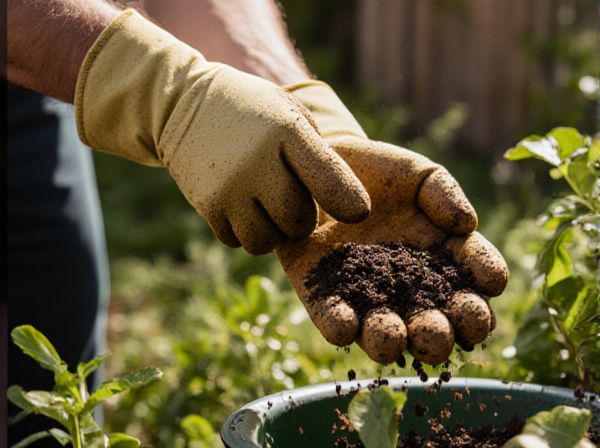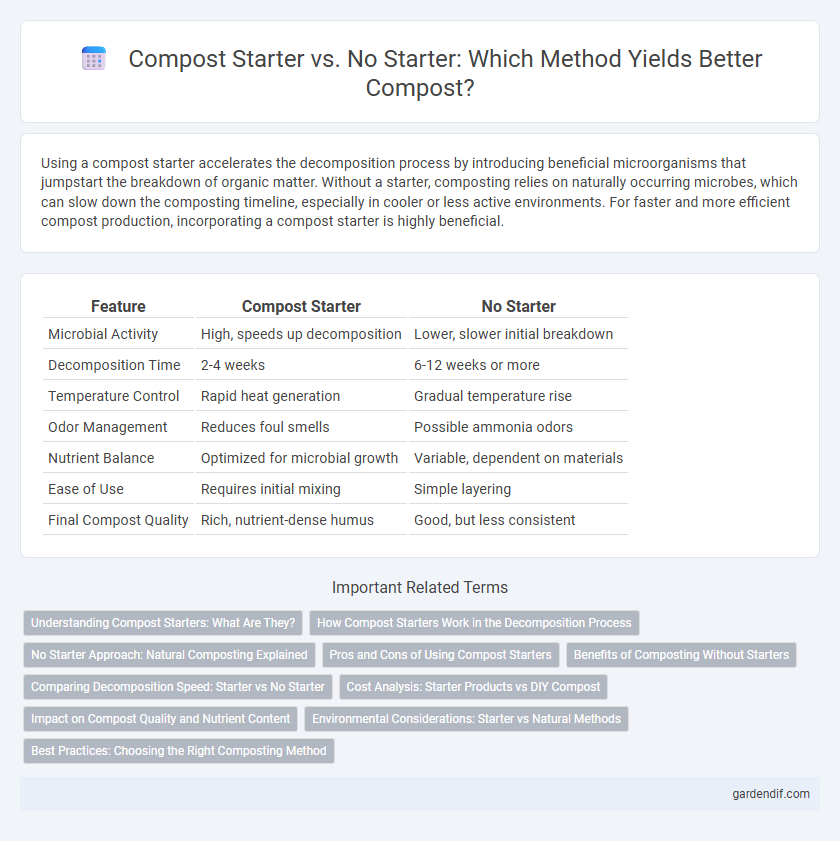
Compost Starter vs No Starter Illustration
Using a compost starter accelerates the decomposition process by introducing beneficial microorganisms that jumpstart the breakdown of organic matter. Without a starter, composting relies on naturally occurring microbes, which can slow down the composting timeline, especially in cooler or less active environments. For faster and more efficient compost production, incorporating a compost starter is highly beneficial.
Table of Comparison
| Feature | Compost Starter | No Starter |
|---|---|---|
| Microbial Activity | High, speeds up decomposition | Lower, slower initial breakdown |
| Decomposition Time | 2-4 weeks | 6-12 weeks or more |
| Temperature Control | Rapid heat generation | Gradual temperature rise |
| Odor Management | Reduces foul smells | Possible ammonia odors |
| Nutrient Balance | Optimized for microbial growth | Variable, dependent on materials |
| Ease of Use | Requires initial mixing | Simple layering |
| Final Compost Quality | Rich, nutrient-dense humus | Good, but less consistent |
Understanding Compost Starters: What Are They?
Compost starters are natural or microbial additives designed to accelerate the decomposition process by introducing beneficial bacteria, fungi, and enzymes into the compost pile. These starters enhance microbial activity, improve nutrient breakdown, and help achieve faster, more efficient organic matter transformation. Using a compost starter can result in richer, nutrient-dense compost compared to waiting for natural microbial colonization without a starter.
How Compost Starters Work in the Decomposition Process
Compost starters accelerate the decomposition process by introducing concentrated populations of beneficial microorganisms, enzymes, and nutrients that break down organic matter more efficiently. These microbial cultures increase the internal temperature of the compost pile, enhancing rapid organic material breakdown and reducing odor production. Without a starter, decomposition relies solely on naturally occurring microbes, resulting in a slower composting process and less predictable nutrient profiles in the finished compost.
No Starter Approach: Natural Composting Explained
The no starter approach to composting relies on naturally occurring microorganisms to break down organic material without added accelerants or inoculants. This method encourages a balanced microbial ecosystem by allowing native bacteria, fungi, and invertebrates to initiate the decomposition process at their own pace, resulting in nutrient-rich humus. Natural composting without starters reduces chemical inputs and promotes sustainable soil health by enhancing microbial diversity and activity over time.
Pros and Cons of Using Compost Starters
Using compost starters accelerates the decomposition process by introducing beneficial microorganisms and enzymes, resulting in faster production of nutrient-rich compost. However, compost starters can increase initial costs and may not always significantly improve compost quality if the organic materials are already well-balanced. Without starters, composting relies on natural microbial populations, which can be slower but cost-effective and environmentally natural.
Benefits of Composting Without Starters
Composting without starters promotes a natural microbial balance by allowing native microorganisms to establish according to the local environment, leading to a robust and self-sustaining decomposition process. This method is cost-effective since it eliminates the need to purchase specialized inoculants, reducing overall gardening expenses. Furthermore, composting without starters encourages organic waste recycling in a simple and eco-friendly manner, enhancing soil health and nutrient availability without introducing external agents.
Comparing Decomposition Speed: Starter vs No Starter
Using a compost starter accelerates the decomposition process by introducing concentrated microbes that jumpstart organic matter breakdown, often reducing composting time from several months to weeks. Without a starter, natural microbial populations must establish themselves gradually, slowing the decomposition rate and extending the composting period. Studies show that compost piles with starters can achieve optimal temperature and maturity faster, enhancing nutrient availability for gardening applications.
Cost Analysis: Starter Products vs DIY Compost
Compost starters, typically ranging from $5 to $20 per packet, can accelerate decomposition by introducing beneficial microbes but add upfront costs compared to DIY composting, which relies solely on organic waste and natural microbial activity at no additional expense. DIY composting offers a cost-effective solution using kitchen scraps, garden clippings, and yard waste with minimal supplies, while starter products may reduce composting time by several weeks, potentially increasing gardening productivity and plant health. Evaluating cost versus time saved is crucial, as starters require investment but may enhance nutrient availability and ease pest control compared to traditional homemade compost methods.
Impact on Compost Quality and Nutrient Content
Using a compost starter accelerates the decomposition process by introducing beneficial microbes, resulting in higher nutrient retention and improved compost quality. Without a starter, composting relies on naturally occurring microorganisms, which may extend the breakdown time and lead to less consistent nutrient profiles. Enhanced microbial activity from starters promotes a richer supply of nitrogen, phosphorus, and potassium essential for soil fertility.
Environmental Considerations: Starter vs Natural Methods
Using compost starters accelerates the decomposition process by introducing concentrated microbial activity, which can reduce greenhouse gas emissions by shortening the composting timeline. Natural methods without starters rely on indigenous microorganisms, promoting biodiversity and minimizing chemical inputs, but may generate more methane during slower decomposition phases. Choosing between starter and natural composting impacts carbon footprint and soil health, with starters offering efficiency and natural methods favoring ecological balance.
Best Practices: Choosing the Right Composting Method
Using a compost starter accelerates microbial activity, resulting in faster decomposition and nutrient-rich humus compared to starting without one. Selecting the right composting method hinges on factors like available materials, temperature control, and desired composting speed, where starters help maintain optimal conditions. Best practices involve assessing environmental variables and organic inputs to decide whether a starter is necessary for efficient breakdown and pathogen control.
Compost Starter vs No Starter Infographic

 gardendif.com
gardendif.com